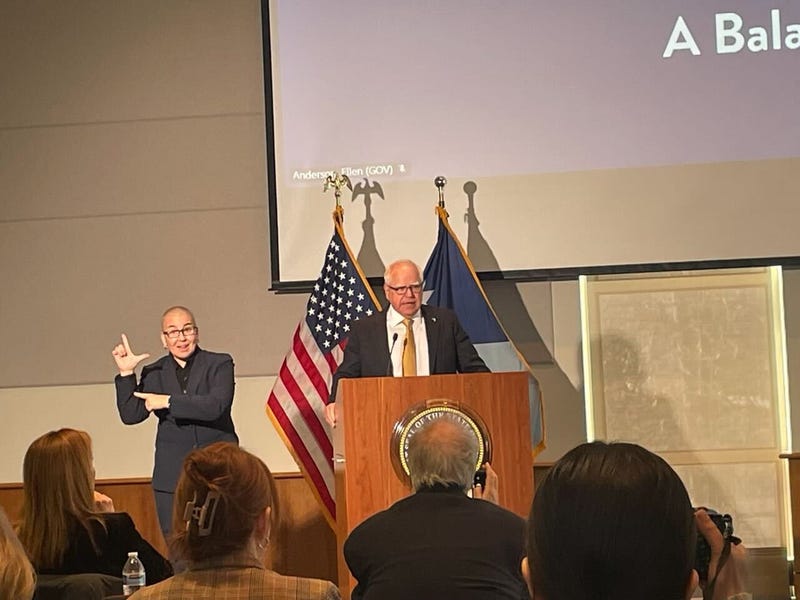
Governor Tim Walz (DFL) rolled out his 2025 biennial budget on Thursday and it includes the first sales tax cut in state history. The cut would be three quarters of a percent across the board. But it also comes with expanding the sales tax to previously untaxed services.
Walz explained it as being a count to President-Elect Donald Trump's threats to impose tariffs, which Walz says will raise costs for Minnesotans. The state is facing a significant budget deficit in the next state budget which Walz says this proposal addresses.
“This budget is responsible, measured, and honest, and it starts with one goal: fiscal responsibility,” said Walz. “Our plan sets Minnesota up for success in the future by addressing long-term budget challenges and protecting the investments we made to improve lives, including universal meals, paid family and medical leave, and tax cuts for seniors and middle-class families.”
Walz also is proposing adding sales tax to services, which WCCO Political Analyst Blois Olson notes is something that former Governor Mark Dayton (DFL) failed to get passed. Republican Speaker-designate Lisa Demuth (Cold Spring) already responded to that proposal, saying on X it won't happen this time either.
"There will be no tax increases this session. Period."
The current forecast show a possible shortfall in the 2028 and 2029 fiscal years. Governor Tim Walz says to offset that he’s proposing cuts to state spending on things like special education and transportation. Walz says if his budget is passed a it would leave $2.1 billion dollars for the next fiscal year and $355 million dollars for the following cycle.
Demuth released a statement slamming the proposal Thursday afternoon, saying they will push for a "responsible" budget for Minnesotans.
"A budget that raises taxes on Minnesotans and cuts funding for long term care is not a budget that values the people of Minnesota," the statement reads. "Democrats already used their one-party control to raise taxes on Minnesotans by more than $10 billion dollars, and spent us into a looming deficit. Any tax increases are off the table. House Republicans will push for a responsible budget that makes life more affordable for families, not one that raises their costs and hurts our seniors."
Senate Republican Leader Mark Johnson (R-East Grand Forks) also released a statement critical of the budget.
"We have an opportunity to get back to responsible spending, lowering taxes, and helping every Minnesotan get essential services they need to live in their community and secure their future prosperity," Johnson says. "The Governor's proposal today missed that opportunity."
Also, as a part of the Walz-Flanagan plan, is a proposal to close loop holes for services offered by wealth managers and lawyers, and the governor says their budget combats fraud and sets Minnesota up for success for years to come, curbing spending growth in the programs that drive the structural deficit.
"These are not just crimes against taxpayers, they're crimes against children, and every single dollar that's lost is a lost opportunity to make those improvements," Walz said. "And just like in private business, we need to have the tools necessary on that."
Of course the governor is referring to the millions of dollars lost in the massive Feeding Our Future COVID fraud, and a more recent case of fraud at a couple of Minnesota autism centers that were raided by the FBI. The governor has recently proposed creation of a new, centralized state agency to detect fraud and financial crimes.
All of this comes under the shadow of a very divided state government, very different from the DLF trifecta that led to the passing of the state's largest budget ever during the last budget cycle. In this case, Walz and the DFL will need to work out the budget details with Republicans. They've heavily criticized Democrats for passing the $70 billion budget two years ago.
Walz said with a divided State Capitol, there needs to be a willingness to find solutions that improve lives.
"You've got an opportunity here to shrink state spending, to cut taxes, to bring fairness to the system," says Walz. "I'm not adding any additional programs to anything, bringing efficiencies to it. This is pretty uncontroversial, so I would hope they come back together."
